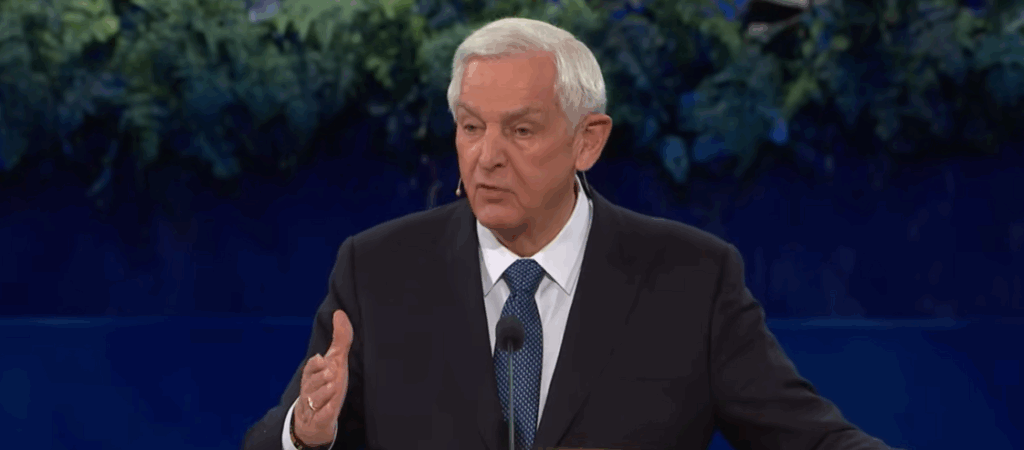“Is David Jeremiah sick?” has been a common question in church lobbies and on social media in recent months. This question carries a deeper narrative of spiritual perseverance and physical resolve, despite the fact that it is frequently asked with concern. Even as he deals with personal health setbacks, Jeremiah, who is now 84, is still regarded as one of the most admired Christian leaders of his generation.
Jeremiah suffered from transverse myelitis, a very uncommon neurological condition, for the past year. He had to temporarily reduce his energy and mobility due to this spinal cord inflammation condition, which forced him to take a break from his busy preaching schedule. Many people observed a noticeable change in his physical appearance during this time, especially his notable weight loss and sporadic use of a walker. These signs sparked a wave of real concern for a man who had dominated the pulpit with towering energy for decades.
Nevertheless, Jeremiah answered with elegant candor rather than backing down. He was seated during his sermons by the time he got back to his church at Shadow Mountain, and he was also remarkably calm, delivering messages with fresh vigor. His decision to sit was motivated by endurance rather than restriction. He reminded his followers that strength frequently comes from adaptation rather than resistance by adjusting to his condition while still preaching.
David Jeremiah – Personal, Health, and Ministry Summary
| Full Name | David Paul Jeremiah |
|---|---|
| Date of Birth | February 13, 1941 |
| Age (as of 2025) | 84 Years Old |
| Occupation | Pastor, Author, Broadcaster |
| Church | Shadow Mountain Community Church, San Diego |
| Founder Of | Turning Point Radio and Television Ministries |
| Major Health Battles | Lymphoma (1994, 1998), Transverse Myelitis (2023) |
| Current Condition | Preaches Seated Due to Fatigue |
| Books Written | Over 100 |
| Family | Married to Donna, 4 children |
| Reference | www.msn.com/en-us/news/us/dr-david-jeremiah-now-his-inspiring-return-after-difficult-health-struggles/ar-AA1sAByo |

This is not Jeremiah’s first health journey. He was given a lymphoma diagnosis in 1994, which would recur in 1998. He eventually recovered from the illness after undergoing a stem cell transplant and intense therapy. When he thought back on that chapter, he frequently referred to it as one of his biggest spiritual obstacles. He recovered with faith, prayer, and family support. Congregants who are coping with their own medical anxieties have found the message he conveys through his fortitude to be especially helpful.
Psalm 138:7, which gave him solace in those dark times, was cited by Jeremiah in a recent sermon: “Even though I walk in the midst of trouble, you will revive me.” Even in a quiet voice, his clarity was remarkable. The source of his serenity—his steadfast conviction that healing frequently starts within—was emphasized in this verse, which was picked not for dramatic effect but rather for its veracity.
Jeremiah continued to see physicians and physical therapists while he recovered from transverse myelitis. Even though his strength has significantly increased since the beginning of the illness, he is realistic about the challenges that lie ahead. But he still has a positive outlook. In an open moment, he stated, “I’m coming back from it,” highlighting the advancement rather than the setback. He changed the focus from illness to resiliency by portraying the event as a recovery.
Jeremiah has gained even more relatability by drawing on his personal experience with hardship. He reflects the struggles of the congregation, many of whom are aging themselves or taking care of loved ones. His example serves as a powerful reminder to aspiring pastors, caregivers, and people dealing with chronic illnesses that ministry doesn’t stop in pain—rather, it grows through it.
A more thorough consideration of leadership in religious communities is also prompted by his story. There is often tremendous pressure on aging ministers to resign as they deal with physical decline. Conversely, Jeremiah’s journey demonstrates that a pastor’s presence, not their posture, defines them. Despite having a different format, his seated sermons have the same spiritual impact as those from decades past. They serve as evidence of what is left over after the body slows down: the calling, the wisdom, and the voice.
He still writes, teaches, and publishes. His most recent work, The Coming Golden Age, demonstrates both personal rejuvenation and theological foresight. It deftly incorporates lessons about enduring adversity with grace while delving into the prophetic themes he has always been passionate about. For many, the book’s publication and his gradual physical recuperation came at a fortuitous moment.
Jeremiah’s seated delivery is both audacious and reassuring in the context of faith broadcasting, where visual performance frequently takes precedence over content. Because of this contrast, the message that comes after his quiet entrance onto the stage is frequently more impactful. Raw truth and humility are presented to viewers used to polished perfection. That is a very flexible ministry in and of itself.
His recent messages have gained depth from his personal anecdotes. He remembered a time as a child when he was climbing a silo on his uncle’s farm and realized that he would have fallen to the bottom if he had taken one more step. Decades later, he can still clearly recall that near-miss, which has come to symbolize his faith in God’s protection. His emotionally charged and nuanced storytelling never fails to enthrall audiences of all ages.
His ministry’s emotional fulcrum continues to be his marriage to Donna, which is now in its sixth decade. Her prayers were what kept him going when he was sick and his voice faltered. Many have been reminded of the sacred bond behind the public persona by their partnership, especially in recent months. She exhibits a unity that is incredibly resilient and profoundly touching by being by his side at church, in interviews, and even while running everyday errands.
Jeremiah claims that his greatest joy is still preaching at Shadow Mountain, despite the fact that it is broadcast in over 16 languages and reaches millions of viewers worldwide. He frequently recites the line, “The light that shines the farthest must shine the brightest at home,” that is taped to his desk. His commitment to authenticity is further demonstrated by that sentiment, which he lived quietly rather than vocally.
Perseverance has been emphasized more in David Jeremiah’s sermons lately. Though always upbeat, the tone now incorporates layers of introspection and real empathy. Jeremiah’s leadership feels both pertinent and desperately needed as society becomes more conscious of aging and its effects on mental and physical health.
Is David Jeremiah ill, then? In a technical sense, yes—he is still recuperating from a disease that limited his strength and mobility. More precisely, though, he is still serving while recovering and adjusting. His state of health enhances rather than defines his message. Even when he is seated, his voice is still loud, and his presence is just as inspiring despite being a little slower.


